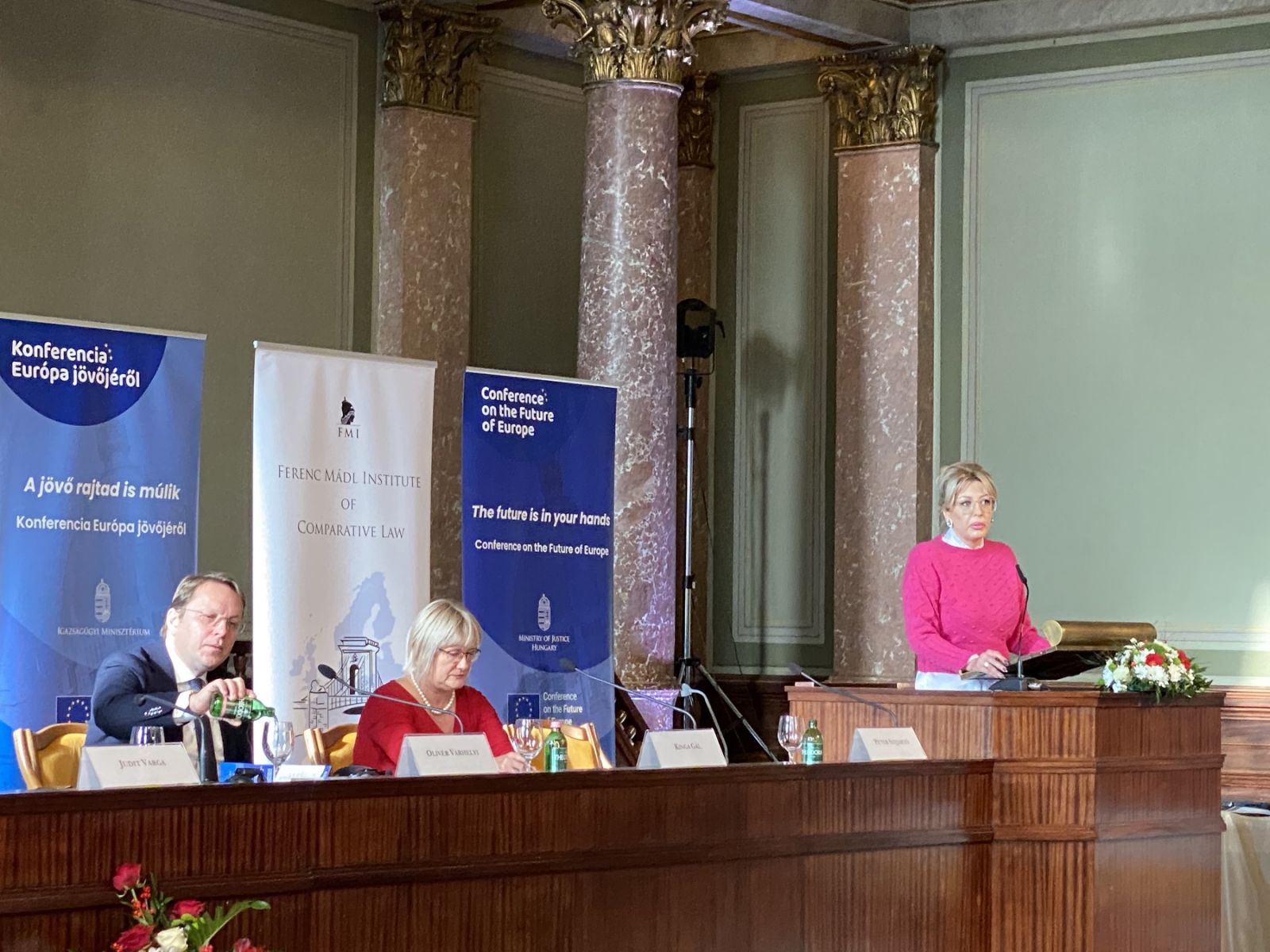
Minister of European Integration Jadranka Joksimović has participated today at the conference ‘Dialogue on the Future of Europe: Is enlargement a key to the future?’, organised in Budapest in the context of the Conference on the Future of Europe, where she has stressed that EU integration of western Balkan countries can benefit the EU which strives to reach new heights of democracy, development, functionality, stability and sustainability.
Joksimović has participated at one of the panels together with Enlargement Commissioner Olivér Várhelyi, Hungarian Minister of Foreign Affairs and Trade Péter Szijjártó, Slovenian State Secretary at the Ministry of Foreign Affairs Gašper Dovžan and the conference organiser, Hungarian Minister of Justice and EU Judit Varga. On the occasion, she noted that some EU Member States still have distrust in the enlargement policy.
According to her, those Member States have distrust in the logic and purpose of enlargement, despite the officially adopted strategy ‘Enhancing the accession process – A credible EU perspective for the Western Balkans’.
She has recalled EC President Ursula von der Leyen’s statement at the Brdo EU–Western Balkans Summit held in October, stressing that she agrees with her statement that the credibility of the EU is on the line.
Joksimović has noted that Von der Leyen then said that the EU wanted the Western Balkans in the EU and that enlargement was an indisputable goal, adding, however, that the lack of the decision to open negotiations with North Macedonia and Albania undermined the EU’s position and influence in the region, thus calling the EU’s credibility as partner into question.
“That is the correct diagnosis. The EU’s partners of enlargement to the Western Balkans feel the EU’s fatigue not only regarding enlargement but also in valorising the candidates’ progress. A partner that does not keep its promises is not a strong partner”, said Joksimović, stressing that it is why it is good that certain Member States invite Western Balkan representatives to participate in discussions and panels on the future of Europe.
She has thanked Hungarian Minister of Justice and EU Judit Varga for organising this conference, stating that Hungary, as well as the entire Visegrad Group, and Slovenia as the EU presidency have expressed their unequivocal commitment to EU enlargement, primarily to the Western Balkans.
Joksimović has stressed that Serbia has done everything to move forward on its integration path, recalling that Serbia immediately accepted the new methodology although the exact content was unknown at the time.
“We have shown trust in the EU and Member States’ best intentions to use the new methodology to make the process more credible, predictable, and easier to understand for some of our citizens. In a way, Serbia helped the EU because we are the only country in the process of accession which is completely ready for the new methodology”, added the Minister.
According to her, after accepting the new methodology, Serbia initiated preparations for the opening of at least one cluster.
In that sense, she has thanked European Commissioner Várhelyi for the fact that the European Commission recognised Serbia’s efforts and recommended the opening of two clusters – cluster 3 and cluster 4.
She has emphasised that demanding reforms in the rule of law area have been conducted in parallel with the preparation for the two clusters.
“We did not want to complain and say that the rules have changed mid-game. We prepared ourselves and finalised all activities concerning major reforms in the area of judiciary in Serbia”, said Joksimović, adding that the citizens will vote on the amendment of the Constitution at a referendum scheduled for 16 January.
She has underlined that those reforms are vital and that they demonstrate the Serbian Government’s commitment to European integration, as well as the commitment of Serbian citizens.
Joksimović has expressed her hope that Serbia will open both clusters the EC recommended, adding that it is, nonetheless, realistic to expect that Cluster 4 will be opened at least.
She has said that the opening of Cluster 4 is important for Serbia as it covers the Green Agenda and sustainable connectivity, providing a clear framework for new EU investments in Serbia in terms of green projects, which will help Serbia in its green transition.
Joksimović has said that it is essential to be “brave and enterprising” in the European integration process and not to see the EU and certain Member States as the sole culprits.
She has noted that there are problems in those countries, and that Serbia has demonstrated its commitment, even despite the crisis and difficult circumstances in the past two years caused by the COVID-19 pandemic.
“It is important that we’ve shown that we’ve worked more during the crisis because we sincerely want to improve reforms in various areas”, stated the Minister.
She has mentioned that Serbia highly appreciates Hungary’s support, although it is sometimes criticised for it due to the issues that occasionally arise between Brussels and Budapest.
“We are good neighbours, we have improved our relations, the Hungarian national minority in Serbia is integrated and represents an excellent bridge to our future cooperation. We are grateful for the support and we will never say no to it”, said Joksimović, addressing the organisers of the conference.
Source: Tanjug













